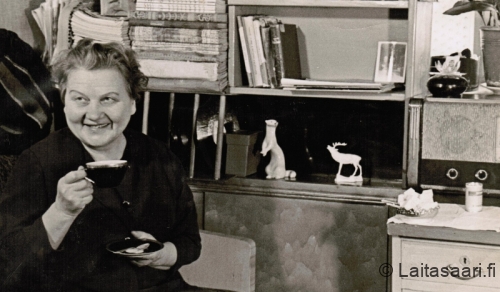A writer and poet, Salli Lund (née Mäkelä, later Hill) was born into the family of a mate, Mäkelä, as the 11th child in Oulu on the 12th of December, 1902. The family moved later from Oulu to the house of Ontero in Laitasaari. Salli’s parents were Matti Esanpoika Mäkelä (originally Roininen, born in Utajärvi on the 9th of January, 1850, died on the 2nd of July, 1929) and Kaisa Kristiina née Sankilampi (born in Oulu on the 23rd of July, 1860, died in Muhos on the 25th of October, 1938). More of the family here but only in Finnish, sorry – written by Salli’s sister, Maria Laukka (Olga Maria née Mäkelä, born in Oulu on the 10th of March, 1883). Salli’s second husband was Jukka Hill(i), who was born in Polvijärvi. See also the pictures of Ontero.
Salli dreamt of continuing studies in high school, but it wasn’t possible because of the lack of money, so she just finished elementary school.
A permanent job as a shop assistant in various cooperative shops of Arina in her home town began in 1920. After seven years, in 1927, Salli Lund, like many others, travelled from Finland to Canada. From there she went to the Soviet Union, together with her husband, Väinö Lund (born in Vaasa) and other Canadian and American Finns in 1932, which was the time of the Great Depression in the world. Salli was expecting her first child, a daughter (Raija), who was born in Petrozavodsk soon after the journey. Her son (Reijo) was born in March, 1937. This period of moving to the Soviet Union and the beginning of life in new circumstances is described in the memoirs called Taipaleita (Stages of journey).
In Petrozavodsk, Soviet-Karelia Lund worked as a labourer, an assistant nurse in a hospital, a correction reader in the newspaper called Totuus (Truth) and as a reporter in a publishing firm. During the war she was evacuated to Ural, working on a collective farm and in a collective paper combine. The father of the family died of typhoid, which he had caught in the war and the family had to beg their bread. Their daughter, Raija, died of undernutrition, in other words hunger, and their son, Reijo, had the same destiny. It means Salli lost her whole family. After the war, in 1944, she returned to Petrozavodsk and continued her work as a correction reader in the printing house. Later she became a reporter in the publishing firm called Karelia. Salli Lund has been described as a lyrical and emotional poet. She was accepeted as a member of the authors’ union in the Soviet Union in 1970.
The poet herself says:
Literature, especially poetry started to attract me already in elementary school. It didn’t leave me alone. It insisted me on trying. And I did try to write them, poems, I mean. Of course, they were such poems as a girl of that age could write. My poems were read aloud on the stage of Liberty-hall in Sadbury and they were published in the local newspaper, Vapaus (Liberty).
After moving to the Soviet Union her work was inspired by new impulses. At that time chorus recitations were very popular. Lund wrote such poems ordered by the house of folk art of the time. Her poems were recitated in the programmes of clubs all over Karelia and also in Triumf-theatre in Petrozavodsk ( “Echoes from heaths” – poems of women labouring in forest work).
Since 1934 Salli Lund published her poems in such literature magazines as Neuvostonainen (Soviet woman) and Rintama (Front), published in Leningrad and in a paper called Punainen Karjala (Red Karelia), in Petrozavodsk; the head of its literature section was a poet, Eemeli Virtanen.
Then there was a longish pause and only after the years of war Salli Lund started to publish poems again in Totuus and Punalippu-album (Red Flag album). After a strict choice, typical of the poet, they formed a book of poems called Soi lauluja Karjalan maa (Karelia is singing). The next poetical work was called Pihkan tuoksua (Smell of resin).
Salli Lund died at the age of 77 after a hard and long illness in Sortavala on the 23rd of June, 1979. 1. We’ll publish some of her poems in the blog.
Soi Lauluja Karjalan maa (1950)
Pihkan tuoksua (1966)
Tuulien kannel ((1971)
Taipaleita (1975)
Virta vierii (1979)
Ja niin tuli aamu… (1980)
– Solja Holappa, translation Liisa Palovaara from Suvela
